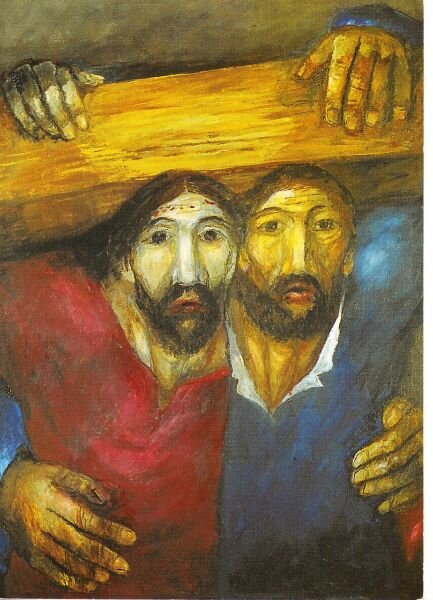|
9/4/2022 April 09th, 2022: Holy Week “Your enemies shall come fawning to you; and you shall tread upon their high places” (Deut 33:29). These are the last words of Moses. Because of his sin of unbelief and disobedience at Meribah, Moses is not permitted to lead his people into Canaan. However, immediately before his death, the Lord leads him to the top of Mount Pisgah and shows him the Promised Land. Now Jesus, whom Moses prefigured, is about to mount to a high place and open another Promised Land for all who had been excluded from it by the original sin of Adam. He who will free all enslaved by sin goes to a shameful form of execution reserved for slaves, subversives and criminals. He, whose power transcends any temporal power, is condemned to a death the spectacular cruelty of which is designed to reinforce the notion of the power of the state and the powerlessness of the individual. He will not climb this hill with the ‘hind’s feet’ of the Psalms; this ascent will be a stumbling, painful one. This is the ‘mountain of myrrh and the hill of frankincense’ (Sol 4:6): myrrh for burial, frankincense for embalming. “So they took Jesus, and he went out, bearing his own cross, to the place called the place of a skull, which is called in Hebrew Golgotha” (Jn 19:17). It may have been the crossbeam that Jesus carried, placed across His shoulders and with His arms bound around it; or it may have been the entire cross, laid heavily across one shoulder. Either way, the dragging weight on his torn flesh must impede His progress cruelly. At some point it was feared that, in his weakened state, Jesus might not survive his climb to Calvary. So “…they seized one Simon of Cyrene, who was coming in from the country, and laid on him the cross, to carry it behind Jesus” (Lk 23:26). The cross is laid on Simon against his will; indeed, we may assume that he bitterly resents his humiliating burden. Is Jesus - as so many of the sick, the incapacitated, the dependent - painfully aware of the reluctance with which Simon’s assistance is given? Already stripped of dignity by his suffering, he must be further humiliated by the obvious distaste with which Simon approaches his task. However, it is likely that the quality of Simon’s acceptance transformed the nature of the giving. We do not know whether Simon was Jew or Gentile; but we do know that his sons, Alexander and Rufus, will become sufficiently prominent in the young Christian church to be mentioned by Mark (Mk 15:21). Was Simon’s involuntary sharing of Christ’s suffering, then, a transforming experience? Did he, on accepting Jesus’ yoke, find, after all, that the yoke was easy and the burden light? “If anyone forces you to go one mile”, Jesus urged at the Sermon on the Mount, “go with him two miles.” A cross may be imposed by God. It may not be accepted willingly but if, at the end, it is accepted, then comes the grace for going the extra mile. Lord, how often have I shouldered your cross unwillingly! You have laid it on my shoulders and I have seen only the burden. I have seldom paused to reflect that, if the woman who touched Your garment in a crowd was instantly healed, how much more powerful might be the sharing of your own cross. Comments are closed.
|
AuthorHelen Gallivan is co-founder with John Dundon of New Pilgrim Path. This blog is adapted from ther book, Dawn without Darkness, published by Veritas. Archives
April 2022
Categories |
 RSS Feed
RSS Feed